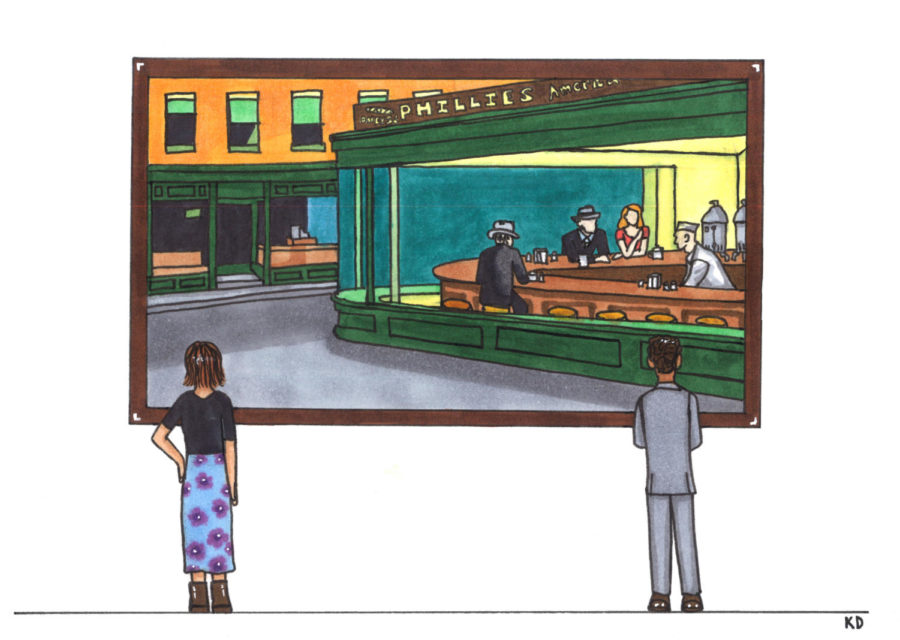In the Art of the Americas wing of the Art Institute of Chicago, Gallery 262, hangs one of the museum’s most instantly recognizable pieces: Edward Hopper’s famous Nighthawks. This rendition of a fictional diner, deep in the heart of a faceless city, is composed of four disparate figures—each personally preoccupied, distant, and yet bound by their singular frame.
Hopper has suggested the painting is a portrayal of American urban loneliness—that long, aching subway ride, tunnels of silver buildings and sidewalks, solitude in the midst of a crowd—a theme that crops up in several of his pieces, defined by a domineering, pensive sadness.
It is this specific thesis that has always drawn me to his work, with the same ribbon of loneliness being drawn taut over my own approach to life. Strangely, however, the longer I look at the painting, the more and more I see not isolation, but instead the unique, fortifying bond of strangers in a room; of the vital importance of these passing glances, smiles, and conversations in our day-to-day life.
I have written previously about loneliness. Of course I have, because in many ways, any writer who has ever written anything has that thread of wonder in their piece. We are all always asking one another, “Do you know what this feeling is like? Have you felt it too? Am I alone? Tell me I’m not alone.” But more specifically, I mean that my first ever piece for The Chicago Maroon was about the loneliness inherent in college: the isolation from self, and the need to find it. I finished that short article with a refrain stolen from a poem by Derek Walcot, urging anyone who read to eat a meal by themselves to rediscover who they really are in the absence of others. I do still believe that we find out who we are in our reactions to our own thoughts, but I have an addendum—an auxiliary proposal, if you will. When you live your everyday life, when you eat that meal alone, look around you and observe how fully and truly surrounded you are by the human condition. In a world, on a college campus that is driven by independence, it becomes ever more important to relish our minute interactions with one another, to understand the joy that comes from the realization that we are never truly alone.
I experience this emotion, let’s call it recognition, in the simplest and strangest of places. More and more this quarter I find myself sleeping early and waking up before dawn breaks, making it to the library just as the doors sigh open. I sit in my corner of Mansueto (three rows up, all the way down, in a patch of sunlight), I work, and I watch the seats fill up around me. There are patterns of regular characters, people who have the same routines as me, but mostly, it’s a turnstile of UChicago students incurring the trials and tribulations of whatever week we are mired in. These trials and tribulations are likely not identical, but sometimes when I think about this sacred nature of ritual, of studying together, of the quiet reassurance of common cause, I am moved near to tears.
Maybe you think I’m melodramatic, and maybe I am, but I would posit that any sense of ordered belonging in a world that is often isolating and random demands emotion. And often, when we are open to feeling it, we receive great reminders of the joy that surrounds us. On Valentine’s Day, I walk up past my old dorm bearing the stings of a bad class, and a girl hands me a flower. In Bart Mart, I’m paying for chips and Pop-Tarts and the cashier slips me a candy bar. I hold the door open and get a nod and thank you, but this is second nature. We are all always passing through each other’s lives. We are all always together.
My point in noticing, digesting, and holding these moments close is simple: it is hard to be alive and alone, even when it is necessary and non-negotiable, and sometimes what you need is not the precise comfort of a loved one but a general reassurance that somebody has lived through what you have, that you are tethered to this world by something deeper than your immediate circle.
Identity is forged by the relationships you have with friends, family, and significant others but also decided by your associations with the world surrounding you. If your truest belief is that this world is scary and foreign and cold, it will remain just that, and in your moments of aloneness, you will have nothing to turn to. If, however, you look at every passing moment as an opportunity, the world cracks open.
It is in these moments that we recognize that although life happens to all of us in eight billion different ways, briefly, we are bound by the same human emotion. A stranger on a bus becomes your confidant, your ally. You are traveling in the same direction, your worlds overlapping in this fleeting but vital manner, because you are experiencing the same 171 trip to 53rd. Maybe the smile you exchange will not be remembered the next year or the next hour, but it is proof that you are seen, that you can be seen by anyone. When relationships fail, when the people you love drop in and out of your life, there is beauty in realizing that you can go on regardless, and as you do, there will be people to surround you. Perhaps not all, or indeed any, of the people you meet tomorrow will remain in your life, but even a single gesture is attachment enough, a recognition of the life we are all living.
Annie Dhal is a third-year in the College.








